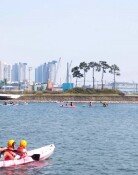Are N.Koreans working in China to fund P`yang`s nukes?
Are N.Koreans working in China to fund P`yang`s nukes?
Posted February. 07, 2013 05:07,
Monthly wage? Whats that?
A North Korean accent was heard Wednesday through the roaring sound of sewing machines at a clothing plant in Dandong, a Chinese city in Liaoning Province sharing a border with North Korea. The voice belonged to a worker in her early 20s who was sent there Jan. 27 by the North along with 70 others to earn foreign currency.
The worker had no idea how much she earned. She said she stayed at a dormitory on the second floor of the plant. When she got up in the morning, she went upstairs to work all day in front of a sewing machine. She needed permission from her boss to go outside. Items of a South Korean brand were among the mountain hiking sportswear she made.
Another North Korean working at a seafood processing factory in Dunggang, an hour drive away from Dandong, also said she did not know her monthly wage or how the town her factory was located in looked like. Wearing a red jacket for work, she said she had worked there for three years. While all of the Chinese workers went home to spend the Lunar New Year`s holidays with their families, the North Korean worker remained inside the factory complex.
The wages of North Koreans working overseas, including the two above, have funded their government`s long-range missile development, which costs billions of dollars. This is because the Stalinist country is too poor to even to feed its own people.
Chinese authorities say more than 10,000 North Koreans are working in Dandong, with one taxi driver saying, Chinese aren`t willing to do hard work now. So North Koreans are taking such jobs.
A supervisor at the seafood processing plant said, We have about 200 North Koreans out of 1,000 workers here, adding, "Without North Korean workers, this plant cannot be fully run." The number of seafood plants like this is about 3,000 in Dandong alone. Workers there must labor from 6 a.m. to 4 p.m. A staff member said, however, Sometimes we have to work until 6 p.m., meaning a 12-hour workday standing in front of worktables.
Other than these factory workers, young North Korean women going to work in two rows like soldiers are seen in the morning in Dandong. These pretty women work at restaurants. A source in Dandong said, Pretty women are sent to restaurants while the others are sent to factories to work.
The average wage of a North Korean worker is said to be 1,300 yuan (208 U.S. dollars) per month, of which 60 percent goes to the North Korean government and agencies. The workers are supposed to get the remaining 500 yuan (80 dollars), but whether they do remains unknown. Considering that the two workers interviewed apparently had no concept of wages, they might not have received pay at all.
North Korea is likely to send more workers overseas. According to Chinese customs officials, trade volume between both countries was 6.03 billion dollars last year, up 7 percent from the previous year but a far cry from the 74-percent rise in 2011, mainly due to the slowdown of the Chinese economy and the falling prices of anthracite and iron ore, which are the major export items of North Korea. Under these circumstances, the North has to send more workers to China to perform menial jobs to secure foreign currency.
A South Korean missionary based in Dandong said, People say many businesses in China`s three northeastern provinces signed labor contracts with North Korea, and as a result, tens of thousands of North Korean workers would be sent to China. I dont know exactly how many have come, but we began to see more North Koreans here from last year.
koh@donga.com







